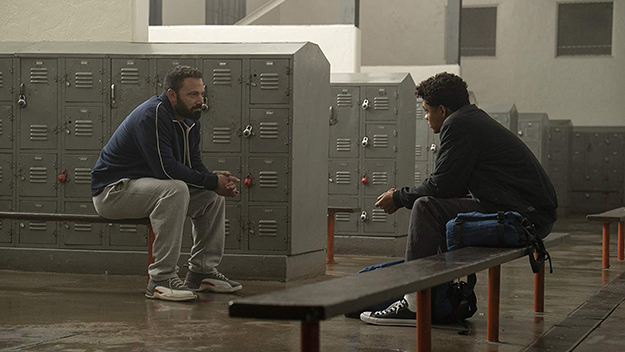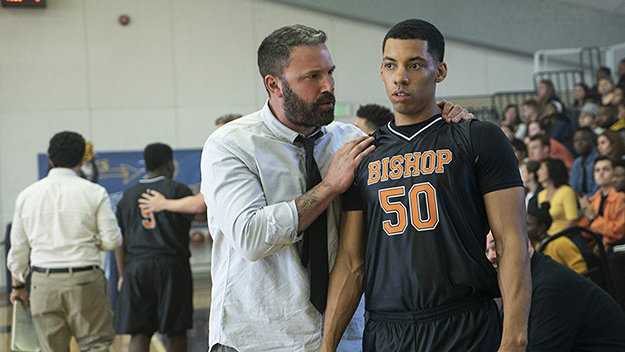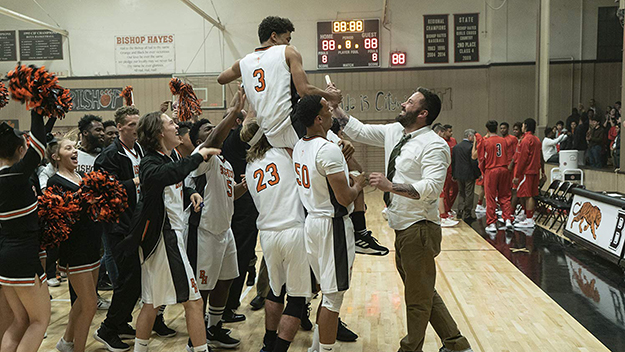Deep Focus: The Way Back

Images from The Way Back (Gavin O’Connor, 2020)
This hybrid of an underdog teen sports movie with a middle-aged man-in-crisis film is worse than a downer. It’s an up-and-downer. Brad Inglesby’s script careens between a misfit hoops team ultimately battling for a championship, kindling fleeting sparks of rah-rah energy, and first-time coach and former high school star Jack Cunningham (Ben Affleck) succumbing to personal despair and alcohol and strangling his own comeback.
In movie-of-the-week form, The Way Back introduces us to Jack as both a hard-drinking Los Angeles construction worker and a delinquent, affable uncle arriving late for Thanksgiving dinner. He rolls his eyes when his disapproving host, his well-meaning, middle-class sister (Michaela Watkins), suggests he might have warned her about his tardiness. (She goads because she cares.) He reacts with fury to her news that his estranged yet concerned wife (Janina Gavankar) has been asking about him. Still, we know he’s basically a good guy because his niece and nephew adore Uncle Jack.
He fills his time slugging down shots at his neighborhood bar, or chugging beer at home, until the padre in charge of his old Catholic school asks him to take over the struggling team from a coach who’s had a heart attack. Inglesby lets Jack’s back story dribble out and sometimes away. What broke up his marriage? How did his basketball career end? What catalyzed his dissolution? And why does the headmaster at Bishop Hayes High believe that Jack, of all people, can solve the school’s basketball woes? Does he assume that a stellar player would be a natural coach? Or does he know that Jack is depressed and suppose that coaching offers him “a way back?”
If the subtext were thick with emotion and suggestion, we wouldn’t mind waiting for the answers. Instead we settle for stock images of a former athletic hero finding solace in a bottle. See Jack morose in a hard hat, trudging toward his truck for alcoholic refueling before heading off to Harold’s Place for the inevitable stupefaction. See Jack abashed when he runs into a schoolmate at a convenience store who reminds him of his high school celebrity.
When it comes to the team, we learn all there is to know in seconds (though the film runs 108 minutes). These stick figures with character pegs get introduced to us like the ensemble in a network pilot: the showboat who must achieve humility, the ladies’ man who steals kisses seconds before boarding the game bus, the roly-poly lad who thinks he energizes the starting five when he does a comical and rippling warm-up dance. In a rare sly moment, the movie pays tribute to its TV antecedents when Jack calls his explosive Caucasian sixth man “White Shadow.”

Only the team’s potential shooting star, Brandon (played by Brandon Wilson), shares the narrative spotlight with Jack—and that’s because they’re similar. The Way Back harks back to the mid-century heyday of Freudian pop drama, and I do mean “pop”: Coach and player share father issues. Jack’s dad (also a drinker) paid attention to him only after he became a luminary on the hardwood. Brandon’s dad hates the sport since his own hoop dreams didn’t pan out, so Jack is the one who pushes Brandon to achieve his breakaway potential. After Jack makes Brandon captain, the coach has to train the hesitant boy into shouting out commands to other players. After Jack lands in rehab, he must break through his pride and reticence and follow his therapist’s orders to talk out his depression and addiction with loved ones. Inglesby sets the film up to be a celebration of talk therapy. But the talk is embarrassingly perfunctory, as when the therapist asks Jack whether he isolated himself—and Jack agrees.
Affleck and the director, Gavin O’Connor, worked beautifully together on the 2016 thriller The Accountant, a tricky white-collar espionage drama that showcases the star’s ability to counterpoint his hefty physicality with nimbleness and his leading-man profile with skewed strokes of humor. As a brilliant, autistic forensic accountant, trained in all manner of martial arts, Affleck relies on his power to project intelligence and his uncanny precision to keep the action surprising and his character intriguing. Here he turns his scenes with petite Anna Kendrick into deadpan comedy routines, slicing through her confusion with his bluntness. Also an accountant, Kendrick is as winsome and open as Affleck is sullen and withdrawn. When she sees him in a deluxe Airstream trailer containing his off-the-books loot and espionage paraphernalia, she asks whether he lives there. He replies, “No, I don’t live here—this is a storage unit; that would be weird,” and makes it sound like a witty riposte..
At his best as a director, in films like Gone Baby Gone (2007), The Town (2010) and Argo (2012), Affleck displays an unusual facility for melding old-fashioned craftsmanship with resonant atmospheres and risk-taking performances. That’s what O’Connor has done, too, especially in 2004’s Miracle and 2011’s Warrior. It must be a relief for Affleck to act for a director with a kindred sensibility, and O’Connor clearly views The Way Back as a showcase for Affleck. The two collaborate magnetically when Jack chain-drinks an entire case of beer. O’Connor keeps track of the disappearing stash as Jack transfers each can from the fridge to the freezer compartment before consumption, then taps it near the top to make sure it isn’t frozen solid. Affleck looks the part of a self-aware ex-athlete who knows his glory days are gone and acts it with authority. He’s at his best when he keeps his sister and his estranged wife at arm’s length or reacts with convulsive anger at their worry for him. Affleck’s holding himself so close reflects Jack’s prolonged grievance: his bitterness has become a comfort.

On the sidelines, Affleck and two patient and observant supporting actors, Al Madrigal as the assistant coach and Jeremy Radin as the team chaplain, locate some genuine workplace humor in the corny contrast between the star’s explosive profanity and the school’s dedication to Roman Catholic principles. And O’Connor captures the spurious energy of a high-school basketball powerhouse, Bishop Hayes’s nemesis, Memorial High, using deafening cheers to rain down shock and awe on its opponents. In one brief, pleasurable action sequence, quick, almost subliminal cutting takes us between Jack plotting out a play and his team using it to score, so it seems to be happening simultaneously. But most of the games are flat. We get that Jack wants his small team to pressure taller, stronger foes up and down the court. But we never get inside the players’ skins, which is where O’Connor brought us with the “Miracle on Ice” hockey team. And we never feel their affection for Jack.
Audiences sometimes love it when a star takes on a role that fans assume is self-revealing, as they’ll do with The Way Back, considering how frank Affleck has been about his alcoholism. But that doesn’t make it a good part. When explanations for Jack’s bad choices and worse habits finally arrive, they register like echoes of other, better books and movies, such as Updike’s Rabbit, Run, which also centered on a former high school basketball hero and pivoted on a child’s death. The “falling action”—Affleck accepting responsibility for his bad acts under addiction—is even more routine than the “falling-down action” of Jack getting sucked into a downward spiral. We go from Jack bottoming out after a disastrous pickup at a bar to him apologizing to his ex as if he’s following a pamphlet from a 12-step program.
Affleck has the gifts and the smarts to take on great American antiheroes, like the older Rabbit Angstrom. He should have seen through the banality and sentimentality of The Way Back. Perhaps he thought this mishmash could work because of its resemblance to his brother Casey’s critical smash about a working-class alcoholic who makes a halting attempt to recover from family tragedy when he mentors a nephew instead of a basketball team. The Way Back wants to be Manchester by the Sea on the hardwood, but it’s more like Hoosiers with a hangover.
Michael Sragow is a contributing editor to Film Comment and writes its Deep Focus column. He is a member of the National Society of Film Critics and the Los Angeles Film Critics Association.







